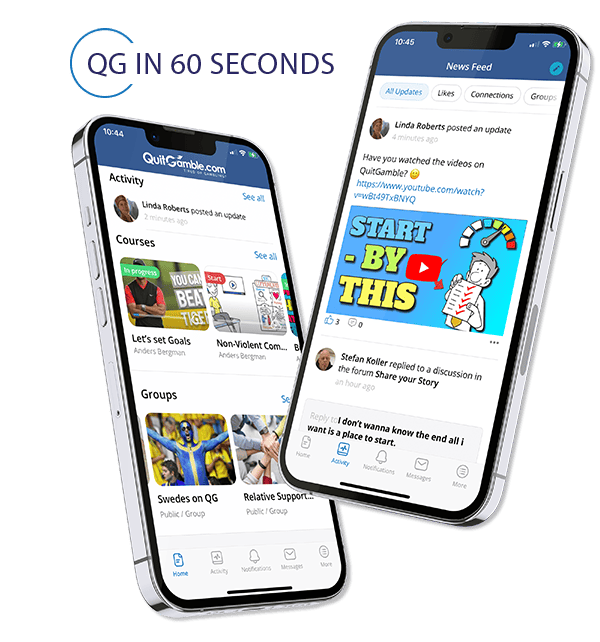LET’S TAKE ACTION
Join our 5-Day Welcome Challenge to kickstart your recovery. Get a map for your quest to become gambling-free. REQUEST FREE ACCESS FOR 7 DAYS and do the challenge for FREE.
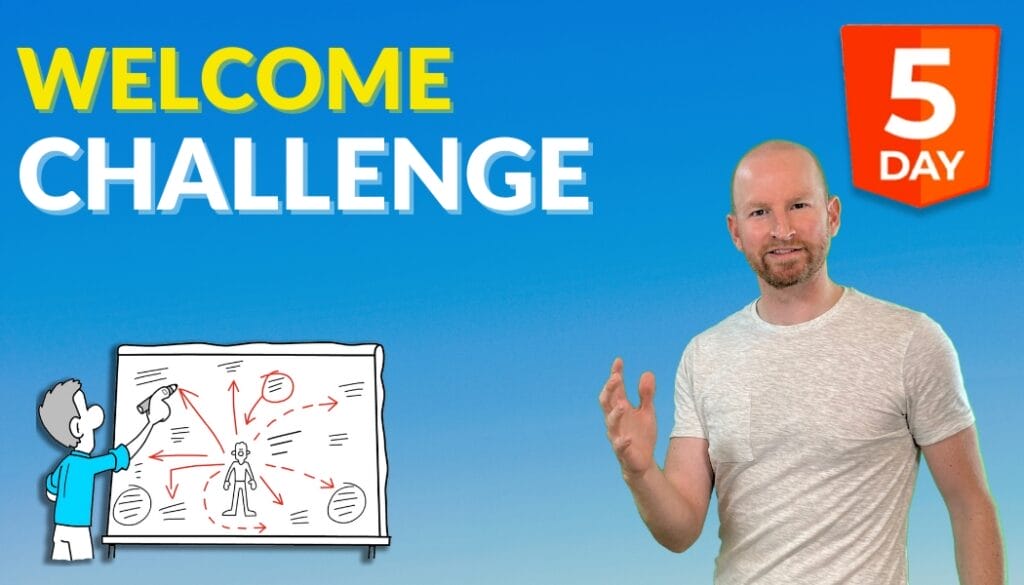
- Understand why you’re gambling.
- Understand why it’s so hard to stop.
- Understand what you can do to stop.
- We’ll support you all the way!
We believe pain is the cause of addiction. Gambling is a way to distract or help us escape pain. The key to successful recovery is understanding what gambling does for us and then working on these areas of your life.
We call this working on the underlying causes of the addiction, and to help you with that is what QuitGamble.com is all about!
what makes QuitGamble.com unique?
QuitGamble.com is an alternative to sleepy support meetings or expensive visits to the shrink. Research shows that 80% of people struggling with gambling problems don’t seek help. We want to change that! That’s why we are online-based. Join our family community, watch animated videos, and everything is open 24/7 Check out a list of all resources here.
The Happiness Test – the first step towards recovery
Are you a compulsive gambler? Do you want to break the habit? We don’t test your gambling habits. Instead, we will test your happiness! HOW?
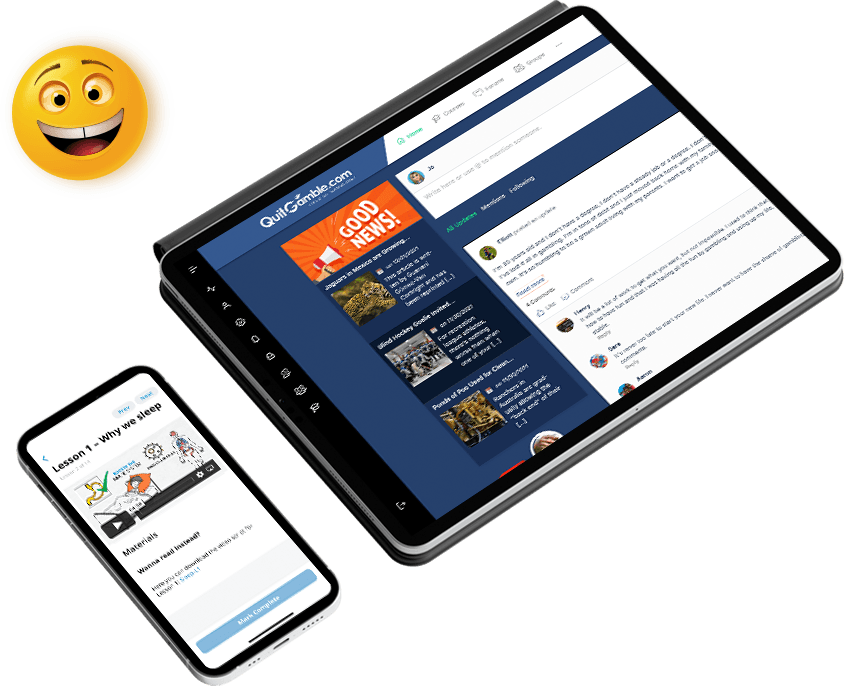
The Happiness Test will help you understand why you’re gambling and why it’s so hard to stop gambling. It analyzes how well the world fulfills your needs and indicates your risk of developing an addiction.
We believe that a happy person is more resistant to addiction. If you’re unhappy, you’re unhappy for a reason. You’re probably missing something and trying to replace it with something else. It could be alcohol, drugs, sex, or gambling. As humans, we are meant to connect to things. If something is missing, we will connect to something else.
The Happiness Test is the foundation of our how to stop gambling addiction strategy, and the test results will give you an ACTION PLAN. Your customized plan to quit gambling. Break free of your cage and turn your life into a fun park!
Wanna know more?
our unique self-help tools
We invite you to help yourself by helping others in the 24/7 community. We’ve created a few guides to help you understand addiction and how to use relapse as a source of information. Also, don’t miss our guides explaining how the gambling industry works.
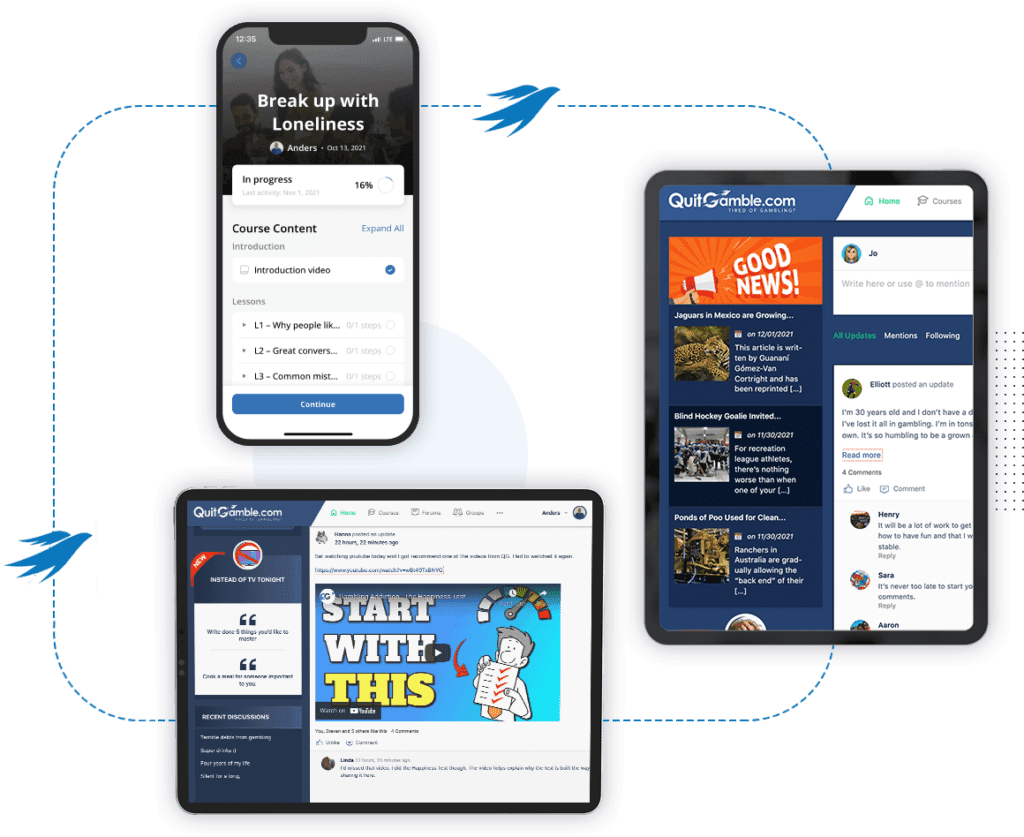
social community for gambling addicts
Find new friends or team up with some people to become each other’s buddies.
As a QuitGamble.com member, you get access to our chatroom and forum. The chat is the perfect place to socialize or ask questions.
Here, you’ll never be lonely. We hope to create the best platform to help gambling addicts’ relatives. Do you have any tricky questions? Join the chat and talk with people 24/7.
The forum is another place to discuss, tell your story, and share your challenges with others. We encourage our members to participate in the community, upload images, ask questions or share their latest videos.
Get help with our Video courses
Happy people are more resistant to developing an addiction. Therefore, the key to battling gambling addiction is to become happier. HOW?

The result of the Happiness test indicates what you’re missing in life. Perhaps sometimes you feel lonely and need some new friends, or you’re worried about your health. Hence, we gamble!
We’ve developed 15 programs of
video lessons with exercises
- Create a Change plan
- Master Goals setting
- Break the Loneliness
- Improve Your Health
- Get Your Dream Job
- How to Handle Stress
- Build Self-Confidence
- Do Things for Others
- Nonviolent Communication
- Be More Productive
- Meaning of Sick Leave
- How to Handle Boredom
Affected others – how to help a gambling addict
Do you have anybody close to you who gambles too much? For every compulsive gambler, there is at least one relative. Do you need help?

As a relative, it’s easy to fall into a co-dependency where you’re adjusting yourself to the behavior of the addict in your life. We recommend that you as well become a member of QuitGamble.com. You can then ask other relatives, co-dependants, and ex-compulsive gamblers questions in the chat and forum. We know you’re in a tough situation than most, but you too can become a HERO! Check out this guide on 21 ways to protect yourself from a gambling spouse.
The guide will help you to protect yourself and give you
tools to deal with the gambling addict.
- Videos
- Learn to Speak Up
- See the Signs
- Prevent Co-Dependence
- Nonviolent Communication
- Action plan
Why join Quit Gamble?

We believe QuitGamble.com is the best way to quit gambling, and that’s why you should sign up.
Start with the Happiness Test.
After completing the test, you’ll receive an email with customized recommendations for what you can do today. As a member of QuitGamble.com, you get access to our online community, motivational emails, 100s of videos, exercises, and challenges.
Instead of reacting to the urge to gamble, we help you become proactive. Step by step, we help you become a happier person by working on what causes pain in your life. Do you think you’d gamble less if you didn’t feel stressed, angry, worried, bored, or isolated? If you do, then QuitGamble.com is perfect for you!
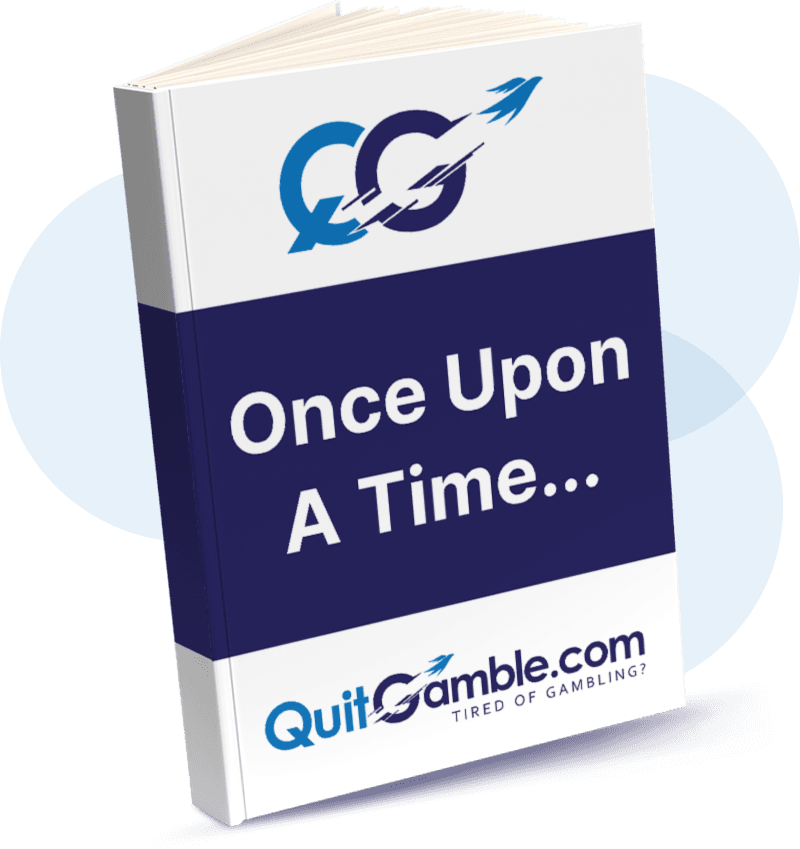
About QuitGamble.com
There are millions of people with gambling problems around the world. Read more on our gambling addiction statistics page. Many countries have some form of support organizations, but far from everyone receives the attention they deserve.
We want to change that. We wanted to build something inexpensive and scalable, so everyone that wants help can get help! QuitGamble.com is unique in its approach: we believe the cause of addiction is pain. If we can relieve the pain, we can get rid of the addiction.
I’ve never been a compulsive gambler; I’ve had other problems. I’ve fought eating disorders for 20 years, tackled depression, and been bullied. Everybody has their fights, problems, insecurities, and stress. My struggles have made me into the person I am today. I chose to see my struggles as fuel…
Energy to create something big!
//Anders Bergman, Founder QuitGamble.com
I’m proud to present QuitGamble.com to you!
FAQ
Can a gambler ever stop?
Yes, we believe that a gambler can stop. The most common ways people attempt to quit gambling are the following. Below, the list you’ll find a more effective method.
- One day, you just decide to stop.
Some people can say goodbye to addiction from one day to another. It requires tremendous self-discipline, but it can be done! - Stay away long enough.
Use every means possible to avoid gambling long enough for the urge to disappear. To do that, you can block all gambling sites on your phone and computer and ban yourself from all casinos in your neighborhood. - Join Gamblers Anonymous (GA)
It’s another method to “stay away long enough”. Many gamblers become ex-gamblers by following GA’s 12-step program while attending support meetings. - Switch gambling addiction to something else.
You’ve probably heard of people who stopped one addiction just to start another. It’s an option to quit gambling addiction too. - Find the reason behind the addiction.
You try to figure out why you’re gambling and what the addiction helps you with.
Most people that try to quit gamble fail. The claws of addiction are set too deep; sooner or later, the addict has setbacks and starts gambling again. The reason the first 2 ways and even GA often fails is that gambling rarely is the problem.
We believe pain is the cause of addiction. When we feel loss, guilt, anxiety, stress, or depression, we experience pain. What we get addicted to is the escape from pain. Gambling, alcohol, and drugs are just ways to relieve the pain. So why do many fail to quit gambling?
Because the pain is still there! When a compulsive gambler experiences pain, his/her brain remembers those precious pain-free moments and what helped them get there. Hence, the compulsive gambler feels the urge to gamble.
Some extraordinary people can withstand the urge long enough to get rid of it, but most of us are only human. Sooner or later, we give in and give the brain what it wants.
The 4th way works because it helps the brain escape the pain like gambling. But most times, the new method/addiction is just as destructive as gambling. Switching between addictions is, therefore, a bad idea.
Find the reason behind the addiction.
With the assumption that pain is the cause of addiction, the way to fight addiction is to identify and work on what causes us pain.
A common mistake many people make is inflicting guilt or blame on a compulsive gambler to make them stop. It sounded like a brilliant idea, but it got the opposite effect. Blame and guilt only create more pain. And what happens then? The urge to escape the pain increases, as does the urge to gamble.
Instead, we recommend the following steps:
- Identify what in your life causes you pain. If you need some inspiration, we’ve created an easy test. We call it The Happiness Test. It’ll show things in your life that might cause you pain.
- Try to work on these areas. If you feel lonely, try to make some new friends. If you feel a lack of meaning, do something fun. If you worry about your finance, create a long-term plan.
- If you need some help, join the Community on QuitGamble.com. You get access to our live chat, forum, social platform, and 100s of lessons, videos, and challenges.
- Together, we can identify what causes you pain and eliminate it from your life.
- What do you think happens when your pain decreases? You’ll experience true freedom!
Let’s ask the question again. Can a gambler ever stop? The answer is yes! But there are not really 5 ways to do it; there is only one way to stop forever: to get rid of the pain that caused the addiction in the first place.
Am I having gambling problems?
Before we start, we’d like you to pat yourself on the shoulder. Finding this article about gambling problems means that you’re acknowledging something in yourself. You’ve already overcome the hardest part of beating a gambling problem – To admit there is a problem. WELL DONE!
So, what does the gambling problem mean?
We think it starts with why we gamble. We believe you’re relatively safe if you gamble for entertainment, even if we don’t recommend it. The problem begins when you gamble to win money. Naturally, you don’t get a gambling problem overnight just because you want to win. Everybody wants to win. It’s when the primary purpose becomes winning that the problem ignites.
Perhaps it’s more accurate to say that people who gamble to win money have problematic gambling behavior or are in the risk zone of becoming addicted. Please check out our complete guide here if you want to know more about this.
This is our definition of a person with gambling problems:
”Someone with gambling problems has started to lose control over their gambling. Gambling takes up more and more time. The fun parts are still larger than the negative consequences, though.”
According to the definition, the person has started to lose control. It could mean that the bets increase, that the person gambles for more than he should, and gambling comes in the way of other things the person needs to do.
We also believe a sign to watch out for is when the person thinks about gambling, even when he/she is not gambling.
Can you recognize any signs of a gambling problem?
Here are a few more questions you can ask yourself:
- Does gambling affect your sleep negatively?
- Does gambling calm you down?
- Do you gamble with the primary purpose of winning money?
- Are you lying to people about how much you gamble?
- Are you using gambling to get away from anything?
- Are you borrowing money to afford to gamble?
Take some time and reflect on these questions. In our article 53 symptoms of gambling addiction, you can find more signs of gambling adddiction. If your answer is yes to any of them, you need to ask yourself one more question:
Do you want to quit gambling?
If the answer is NO, then we recommend you poke around on QuitGamble.com for a while. We can especially recommend the guide about “Addiction”, “How the casino tricks you”, and “Can you win?”. These guides will not stop you from gambling. But they will provide you with valuable information, so you’ll know what is happening around you.
Suppose the answer is YES – You want to quit gamble. Congratulations! WOW, you’ve just taken a life-altering decision. Before we begin, go to a mirror and give yourself a HIGH FIVE to celebrate your courage.
Here is the good news! It’s easier to cure gambling problems than a gambling addiction. Commonly, people with gambling problems don’t see gambling as a problem. YOU have already done it! Well done!
Here are the actions we recommend you do:
- Do the Happiness Test. It’ll not show if you’re addicted to gambling. Instead, it’ll show how we can help you.
- Sign up for a free trial membership on QuitGamble.com to get access to our social platform, lessons, videos, live chat, and forum.
- Welcome! Make yourself at home, set up your profile, and share your story.
- Begin your journey to becoming gambling free by creating a Change Plan
How bad is a gambling addiction?
A gambling addiction can seriously affect your health, finances, and relationships. BUT, gambling is rarely the real problem. It’s just the symptom of something else. Successful recovery begins by understanding what gambling is doing for you.
In this article, we will do our best to answer the question; how bad is a gambling addiction? To begin with, we’d like to show you our definition of a pathological gambler.
”For a gambling addict, the negative consequences are obvious; people around the person have started to react; the finances and personal health are affected. The person focuses on finding new money to gamble with, and gambling is not fun anymore. Instead, the addicted is driven by a desperation to win back the money he/she has lost.”
Signs of gambling addiction
In our article about addiction, we visualize the connection between why a person is gambling and the consequences it can get. In short, there are three stages of the gambling addiction curve. The first part is gambling for fun. It can be harmless if the person is not prone to get addicted. The second step is gambling to win. This gambling behavior can be problematic and can quickly escalate into an addiction. In the steep declining part of the curve, the person tries to win back the money he/she lost.
As the definition states, gambling is not fun for a compulsive gambler. Gambling is instead a desperate attempt to win back all the lost money. It’s a highly destructive behavior characterized by:
- Letting gambling dictate his/her life.
- The bets are increasing fast, and the losses are accelerating.
- Lies to people about the losses
- Takes loans and hunts money to gamble with
- The person looks for a way out, and he/she often has suicidal thoughts.
How bad is a gambling addiction? It is terrible, and it’s potentially dangerous too. If it doesn’t stop, it might ruin the addict’s life.
Sorry if we scared you! Sometimes it’s necessary to take things seriously. But don’t worry, there is some good news in all this. Before we take the good news, we’d like you to ask yourself a few questions.
- Do you gamble with money that is not yours?
- Do you use gambling as a way to escape from other problems?
- Have you considered any criminal acts to get money for gambling?
- Do you lie to the people around you about your gambling activities?
- Have you thought about harming yourself during the last month?
- Do you think of gambling even when you don’t gamble?
- Does the time you spend gambling affect your work or family?
Suppose you answered yes to any of these questions. Please take a moment and write down what you do. It’s a great exercise and something you can look back on to see your progress in a few weeks.
Example:
Do you gamble with money that is not yours?
Yes, I have borrowed money from friends and have not paid them back. I used my credit card, took loans in the bank, and took money from our vacation savings.
This exercise might make you feel bad. But it’s a way to understand what is happening and get it down on paper. It’s also the starting point of accepting the situation and starts taking responsibility for it.
Let’s look at the good news!
No matter where you are today, there is help you can get! You can join clinics, hotlines, meetings, and online communities. You’re not alone; millions in similar situations have regained control of their lives.
Have you tried to quit but failed? You’re not alone there either; most people struggle with quitting gambling because gambling is rarely the problem. Compulsive gambling is just a symptom of something else.
On QuitGamble.com, we believe PAIN is the cause of addiction. When we feel pain, we can do almost anything to escape it. When gambling addicts describe the moments they gamble, they often use words like quiet, calming, and freedom. Gambling is an effective way to escape pain! But it’s the escape from the pain we get addicted to, not the gambling itself.
That’s why people often fall into another addiction when they’re trying to quit drinking, smoking, or gambling.
How to use this information?
Follow these 9 steps to quit gambling addiction:
- Understand why you gamble
- Forgive yourself
- Build motivation to stop gambling
- Create change
- Find support from others.
- Work on the underlying causes.
- Engage in a community.
- Take responsibility for the consequences of your gambling
- Celebrate yourself
You can find the full stop gambling guide here.
How bad is a gambling addiction? It can be awful, but there are many things you can do to prevent those things from happening!
You’ve already taken the first step! Let’s do the rest together!
Is gambling a mental illness?
We at QuitGamble.com aren’t medical physicians nor have advanced degrees in psychology, but we’ll do our best to answer the question: is gambling a mental illness?
The definition of a mental health disorder, according to the Mayo Clinic, is:
“Mental illness, also called mental health disorders, refers to a wide range of mental health conditions – disorders that affect your mood, thinking, and behavior. Examples of mental illness include depression, anxiety disorders, schizophrenia, eating disorders, and addictive behaviors.”
Source: MayoClinic.org
According to the definition of mental health disorder, gambling disorders or pathological gambling are mental illnesses. But let’s take a closer look at what happens in the brain when a person gambles and what consequences it may create over time.
How dopamine affects the brain
Many gamblers describe a sensation of ecstasy when they gamble. “It’s such a rush to put money on the table and place a bet”. The sensation they feel comes from dopamine released in the brain. Dopamine is part of the brain’s reward system, and we feel good when dopamine is released in our bodies.
One reason slot machines are so addictive is that they create quick dopamine rushes repeatedly. Sometimes multiple times per minute.
Have you heard that near-wins give almost as high dopamine rushes as an actual win? Why? According to professor Luke Clark at the University of British Columbia, the brain thinks we’re improving when we almost win. We were so close! Next time we’ll make it!
Let’s take an example from something we’ve all done: Learn how to ride a bike. As part of the learning process, we fell many times. Each fall was a near-win for the brain, so the brain released dopamine to make us forget our fear of falling and the pain the falls caused to keep us trying.
The game creators are hijacking this reward system in their slots! You can read more about how the slots are made to make you addicted here.
Over time, a person with a gambling disorder gets less sensitive to dopamine. The brain needs bigger dopamine kicks for the same effect. [1] As a result, the addict places higher bets and takes bigger risks.
Consequences for the brain:
As part of the discussion, if gambling is a mental disease, people often ask if some people are more sensitive to becoming addicted than others – If anything in their brains makes them addicted.
The Reward Deficiency model states that some people have an under-active reward system in the brain. When the reward system is under-active, the person doesn’t get the same dopamine rewards as an average person. Researchers like [2] argue that these people create a seeking behavior. It means they get drawn to ways that can stimulate their reward system. Gambling is one of these ways. According to the Reward deficiency model, some brains are more prone to become addicted.
When researchers study the brain of a gambling addict in an MRI scanner, they can see a lower activity in the prefrontal cortex when the person is subjected to something gambling-related.
The prefrontal cortex controls decision-making, impulse control, and cognitive control. People with gambling problems with lower activity in the prefrontal cortex are more likely to be impulsive and sensitive to any stimuli related to gambling.
Why is this important?
An impulsive person has significant problems with delayed gratification, choosing between a small reward now or a bigger reward later. “I think the take-home message is that there are probably several processing problems in people with gambling disorder. Research indicates they are processing risk and reward incorrectly and processing current versus long-term consequences incorrectly,” says Jon Grant [3][4]
Where the research is today
Even if researchers can show that the brain of a person with gambling problems looks different from a healthy brain, they don’t know why. It’s a question of cause and effect. Did the person become addicted to gambling because of a particular brain structure, or did gambling cause the brain to change?
To answer that question, the researchers need to follow a person from playing for fun to becoming an addict. To our knowledge, no such study has been made so far.
So, is gambling addiction a disease?
By labeling anything a sickness, one would make the person a victim. Illnesses should be treated with medicine! At the same time, it strips away personal responsibility, and MORE IMPORTANTLY, it makes the person powerless!
We don’t want to create victims. YOU ARE NOT A VICTIM! You have power over yourself and your actions. It means you can do something about your situation. And we will help you succeed!
We’re not treating gambling problems as a sickness, but like the rehabilitation of a broken leg, one should avoid leaning on a broken leg until it’s healed. In your case, it means you need to stay away from gambling.
Dopamine works as a painkiller in the body. We believe helping you ease the pain will lower the need for dopamine and decrease the urge to gamble.
References:
- https://www.nature.com/articles/4000892.pdf?origin=ppub
- (Blum, Noble 2001) Part 1: Genetic Antecedents of “Reward Deficiency Syndrome”
- (Grant 2011) Gambling disorders. The Lancet. 378(9806): 1874-1884
- (Grant 2005) Comorbidity of DSM-IV pathological gambling and other psychiatric disorders: Results from the national epidemiologic survey on alcohol and related conditions. Journal of Clinical Psychiatry. 66(5): 564-574
- Want to know more about Prof Luke Clark? Visit https://psych.ubc.ca/profile/luke-clark/
How do I quit gambling?
If you’re struggling with how to quit gamble, you’re not alone. Odds are you’ve tried several times but are falling back into it. Here are the best steps we know to how to quit gambling addiction.
Step 1 – Why do you gamble?
First, you need to figure out why you’re gambling. Perhaps it started as something fun – Gambling was exciting and filled you with energy, dopamine, and adrenaline. But for many people, the motive change over time.
On the page about addiction, we describe the Gambling addiction curve. Read it to learn more. Briefly, the gambling addiction curve visualizes the connection between why we gamble and the problems it may cause.
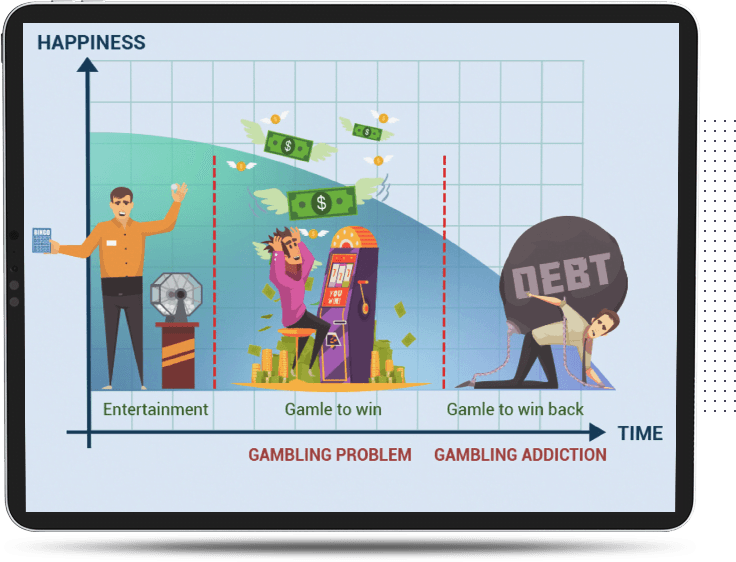
In short: Gambling for entertainment is okay (if you’re not sensitive to being addicted). But gradually, the reason to gamble changes to win money. If you gamble to win, you’re in the risk zone of becoming addicted. We believe a person who gambles to win money has problematic gambling behavior. In the third part of the curve, the person gambles to win back money. At that stage, gambling is not fun anymore. It has become complicated to quit gambling, and the person has developed a gambling addiction.
Where do you see yourself on the curve?
There is more to the WHY. Most people gamble to escape from something. In front of the slot machines, it’s quiet. The mind is calm, and the person feels fully immersed in the game.
Do you use gambling to escape from anything? Take a moment to write down the reasons you gamble.
Step 2 -Understand what causes the addiction.
Our first assumption on QuitGamble.com, we believe that pain is the cause of addiction. Emotional and mental pain, and sometimes even physical pain. When we’re in pain, we will do anything to escape it. Gambling, drugs, and alcohol are often effective ways to relieve pain temporarily. BUT, it’s the escape from the pain we get addicted to, not the means used to escape. Gambling, drugs, and alcohol are just ways to escape.
Staying away from gambling is one answer to quitting gambling addiction. But it’s not enough! Because, as part of the addiction, your brain has made the connection between gambling and these pain-free moments. So, every time you experience pain, you’ll be drawn to gamble again. Alternatively, you find another way to escape the pain. That’s why it’s so common for people to switch from one addiction to another.
Our second assumption is that a happy person experiences less pain than an unhappy person. It means that a Happy person has less need to escape pain. Ultimately, we believe a happy person is more resistant to becoming addicted to anything.
Step 3 – What causes pain in your life?
Now we know that pain is one answer to the question; how to quit gambling? Let’s examine that further.
Please reflect for a moment and write down things that cause you pain in life.
- Are you stressed at work?
- Do you experience a lack of meaning in life?
- Do you feel lonely, or are you bored?
- Are you worried about your finances?
Many things cause pain. If you need some inspiration, we recommend you take the Happiness Test. (Click here, it opens up in a new window) The Happiness Test doesn’t show if you’re addicted to gambling. Instead, it focuses on things that might cause you pain and hence make gambling so appealing.
Step 4 – Decrease the pain in your life.
If you want to maximize your chances, quit gambling permanently. You need to find ways to deal with things that cause you pain. What can you do to reduce the pain?
We have developed QuitGamble.com to help you ease the pain. Step by step, we hope to identify and work on your origins of pain. The Happiness test is the starting point, and it helps us create an individual plan for you. Here are some examples:
- If you feel lonely, we help you make new friends.
- If you feel bored, we help you with inspiration and ideas.
- If you worry about your health, we have created an easy program to get you back.
We want to fill your life with fun and happy moments. Together, we can identify and eliminate each area that causes you pain. Do you think a person with many friends, a schedule full of exciting things to do, and who feels in control will gamble less than a bored person who feels abandoned and sits at home alone?
No matter where you are on the gambling addiction curve, and no matter what your life looks like today, we believe the answer to gambling is to start attacking the roots of pain.
What do you call a gambling addict?
There are several standard terms for a gambling addict. Here are some of them:
- Compulsive gambler
- Addicted gambler
- Pathological gambler
- Problem gambler
- Inveterate gambler
- Degenerate gambler
- Harmful gambler
BUT, let’s not forget the MOST IMPORTANT term: HUMAN.
Labeling people will not help at all. It will only shame them and make things worse. Sure, the first stage of any recovery is admitting a problem, but after that, it’s time to look forward.
Let’s use a positive way of talking instead. Before we take action, we recommend you call the person by their name.
If you want to help a gambling addict, do the following steps:
- Identify the cause of addiction. Why is the person gambling? Try to go deeper than just winning money. A tip is to ask: what happens when the person gambles? How does it feel? What does the person think about it, then? If you need more inspiration, we recommend doing the Happiness Test!
- Often, pain is the cause of addiction. Try to eliminate the sources of pain. It can, for instance, be guilt, loneliness, stress, anxiety, depression, or poor self-esteem.
- On QuitGamble.com, you can find 15 courses created to help people ease their pain. Some deal with the social parts of life, others with health, boredom, and lack of meaning. You can sign up for a free trial membership today!
Good Luck!
Why can’t I stop gambling?
We believe pain is the cause of addiction. Gambling is just a way to escape the pain. The key to stopping gambling is to understand what gambling is doing for you. This article will show you how.
Most people say that gambling is addictive. Some even get offended if you say something else. It’s the escape from the pain we get addicted to. Can you relate to that?
If you’re struggling with gambling, you’re not alone. The first thing we ask people that come to us is:
What is gambling doing for you? And what happens when you gamble?
Have you ever asked yourself those questions? We believe the answers will help you understand why stopping gambling is so hard. WHY? Because we think addiction is an upside. Our brains are way too smart to get addicted to anything destructive!
In other words, something happens when a person gambles. It might suddenly be quiet, the person might be able to relax, or he/she gets a little time for themselves. Common for all these is that gambling puts you in a different state of mind. We believe this is the reason it’s so hard to quit.
How does it feel when you hear this? Can you relate to it? If so, please keep reading!
On QuitGamble.com, we’ve developed a test called “the Happiness Test”. It doesn’t say if you’re addicted to gambling. Instead, it’s designed to help you understand why gambling is so attractive to you and, ultimately, what you can do to discontinue gambling. The Happiness Test will give you an indication of what causes you pain in your life. Remember, we believe pain is the cause of addiction. So, fighting pain means fighting the cause of addiction.
After the Happiness Test, the real journey begins. You get invited to a platform developed to help you answer, “Why can’t I stop gambling?”. On QG, you become a member of a society full of people who struggle with gambling problems. The community is there as support and a place to make new friends.
We believe a happy person is more resistant to addiction because he/she experiences less pain. So, on QG, our goal is to help you become a happier person step by step. Does that sound interesting?
What is the difference between problem gambling and pathological gambling?
For a problem gambler, gambling has started to have adverse effects on the gambler’s life, finance, and relationships. Pathological gambler has lost all control over their gambling. He/she gambles with no rewards to the consequences.
On QuitGamble.com, we’ve developed the gambling addiction curve. It’s a visualization of the connection between why someone gambles and the risk of developing a problem. You can see the Gambling addiction curve:
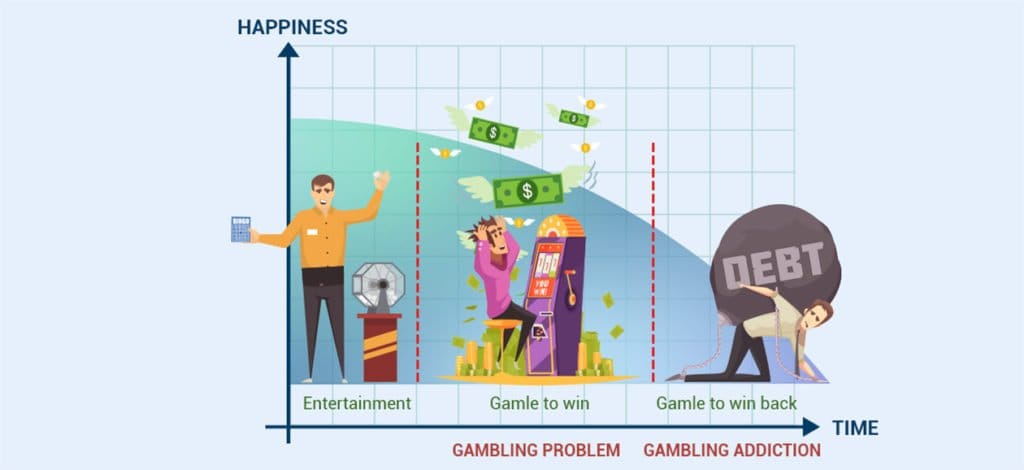
We believe gambling becomes a problem when the person has a clear motive to win. When gambling becomes a way to make money, the person starts to show problematic gambling behavior. Naturally, nobody would spend money on a roulette table if there was no chance to win; the problem is that winning becomes the prime purpose of gambling.
Why is it a problem?
Because the house always wins in the long run. Nobody can beat the casino. Sure, somebody can hit the jackpot, but that is just a lucky shot. If the person continues playing, he/she will eventually lose it all. That’s why we believe a person has gambling problems as soon as he/she starts seeing gambling as a way to become rich.
A pathologic gambler, compulsive gambler, or gambling addict has taken their gambling problem even further. When gambling becomes compulsive/pathological, the person has lost control. At this stage, gambling controls the person’s life. On the gambling addiction curve, we visualize this as a motive to win back the person‘s money. Gambling is not fun anymore, but the urge to gamble has taken over completely.
Here are some of the signs of pathological gambling:
- The person lets gambling control his life
- The person enables gambling to control his life.
- The person lies to people around
- The person takes loans, and his debts grow.
- Gambling is not fun anymore. The person is desperate to win back everything he’s lost.
- The person is always looking for new money to play with.
- The person looks for a way out; the thought of suicide is common.
If you recognize any of these symptoms, we recommend seeking help for yourself or anybody close to you. If you’re a relative, we recommend you read the Relative guide. In the Relative guide, you can get tips on the signs of gambling addiction, how to talk with a compulsive gambler, and avoid becoming co-dependent. As a member, you can chat with other people in the same situation as you’re in. Sign up for free here
If you feel that you have a gambling problem or need some help to quit, we recommend starting here on QuitGamble.com by doing our Happiness Test. It’s the first step on your journey to becoming gambling-free.
